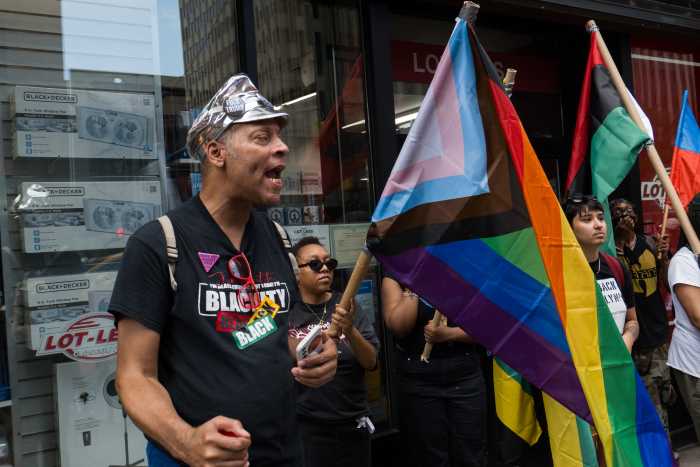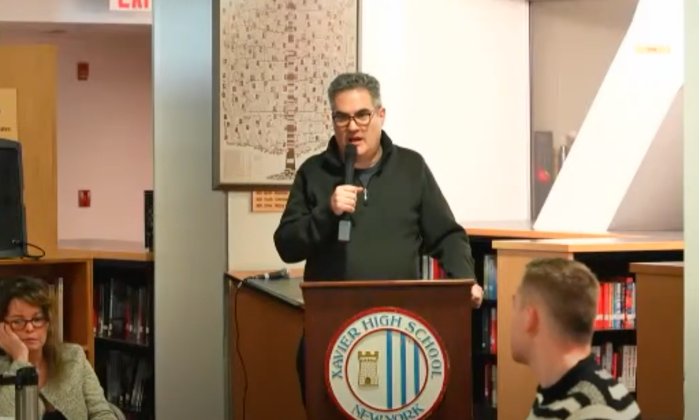Barely eight months after New York State’s gay rights movement won its biggest victory ever, with the enactment of marriage equality, the Empire State Pride Agenda, the state’s LGBT lobby, has fired its executive director, Ross Levi, Gay City News has learned.
The action came in a March 5 conference call with members of the boards of the organization’s two arms –– the Empire State Pride Agenda, Inc., its lobbying and political action component, and the Empire State Pride Agenda Foundation, Inc., which does educational, organizing, and advocacy work on behalf of the LGBT community.
The two boards, which have some overlap, include nearly three-dozen members. According to two board members who deliberated on the call but wished to remain anonymous, the decision was broadly embraced by those participating on March 5.
In a call with Gay City News, the group’s two board leaders –– Louis A. Bradbury and Marla Hassner –– confirmed Levi’s departure. He “will be stepping down” effective April 6, said Hassner, a co-chair of ESPA’s foundation and vice chair of the lobbying and political action arm.
Asked how the phrase “stepping down” squared with the boards’ decision to terminate Levi’s employment, Hassner said, “The Pride Agenda does not comment on personnel matters.”
[Moments after this story was posted online, the group released a statement saying “Levi is no longer serving as executive director. Lynn Faria, our current deputy executive director, will serve as interim executive director effective immediately.”]
But accounts provided independently by the two other board members who spoke to Gay City News were in remarkable lockstep with each other on what led to the demise of Levi’s tenure, which lasted less than 22 months: There was widespread dissatisfaction with Levi and the organization’s leadership on the marriage fight last year –– where ESPA shared responsibilities with other leading advocacy groups, including the Human Rights Campaign (HRC), Freedom to Marry, the Gill Action Fund, the Log Cabin Republicans, and Marriage Equality New York.
Board members, the two agreed, were also unhappy that Levi had not defined a clear vision for the group’s post-marriage equality agenda and was not achieving fundraising goals.
Reached by phone on the evening of March 5, Levi declined comment, but said he would have something to say at a later time. [On the morning of March 6, Levi issued a statement, but took no questions, for the time being he said.]
Recalling last year’s fight for marriage equality in Albany, the two board members willing to speak in detail about the firing said the consensus among their colleagues was that Levi let other groups move to the fore, both in public visibility and behind closed doors, but that at times, as well, ESPA was asked to step back –– including, in one instance, by Governor Andrew Cuomo, who urged other advocates to take the lead in negotiating with the Republican senators needed to provide the margin of victory last June 24.
As the marriage fight heated up between February and June of last year, HRC, which led a high-profile effort to recruit well-known figures –– including Barbara Bush, one of the former president’s twin daughters, hip-hip mogul Russell Simmons, celebrity chef Mario Batali, and former New York Ranger Sean Avery –– to record pro-marriage equality videos, also won more attention in the press, with Brian Ellner, who headed up the group’s New York drive, often quoted in the New York Times.
The board members, however, emphasized what advocates have consistently said about the Albany effort –– collaboration among the players worked to advance the ball. The concern was not about ESPA’s posture relative to HRC but rather the group’s own effectiveness.
Levi, the two board members said, also clashed with the board over where the group’s focus should be now that marriage equality was a fact in New York. One said Levi believed the organization should become engaged in Washington issues –– something it has not done before –– but board members insisted there was ample work to be done here in New York.
Asked what the group’s priorities would be going forward, Bradbury, who chairs ESPA’s lobbying and political arm and is co-chair with Hassner of the foundation, said passage of the Gender Expression Non-Discrimination Act (GENDA), a long-stalled transgender civil rights law, “standing by those elected officials who stood with us,” and advocating for funds to meet the health and human services needs of the LGBT community would be paramount. ESPA has secured well over $50 million in such funding, specifically benefiting LGBT service organizations, since 2000, and Hassner said that the push to increase public dollars for homeless LGBT youth would be an important part of the group’s efforts going forward.
Noting that Levi had joined ESPA more than a dozen years ago, based for much of that time in Albany, Hassner said he had participated in most of the group’s major achievements –– including passage of the Sexual Orientation Non-Discrimination Act in 2002 –– and “has had a lasting positive impact on LGBT people across New York State.”
The group clearly hoped that Levi’s departure could be framed in that sort of positive light rather than becoming a source of public controversy, and sought to negotiate what one board member described as a “generous severance package.” That effort was undone, two board members told Gay City News, by Levi’s unwillingness, on advice of counsel, to sign a confidentiality agreement that would have barred his talking publicly about his ouster.
Levi, who had been serving as the group’s Albany-based director of public policy and education, was named executive director on May 22, 2010, just one day after the abrupt withdrawal of Ellner, whose appointment the board had been expected to approve and had even been heralded in a New York Times story the week before. The upheaval came at a sensitive time for the organization. The Levi appointment was made the afternoon of ESPA’s annual Rochester dinner, one of its biggest events outside New York City, and he was the permanent replacement for Alan Van Capelle, who resigned in the wake of the unsuccessful State Senate marriage equality vote in December 2009, when advocates fell short by a startling 38-24 vote.
In the wake of Ellner suddenly falling out of the picture –– his candidacy had come under fire in some quarters for his ties to Mayor Michael Bloomberg, whose closest State Senate allies were several Republicans adamantly opposed to gay marriage –– Frank Selvaggi, a board member who was then one of the co-chairs, said, “During our search, Ross was identified as the strongest candidate for the position because of his long history of service to the organization, vast knowledge of state government, and strong connection [to] the statewide LGBT community. The Board feels strongly that Ross is the right leader for us.”
That show of support notwithstanding, the group could not shake the widespread impression that its executive director search had gone awry.
Hassner said a search committee to replace Levi would be formed immediately, but offered no deadline for that group completing its work.
The most recent ESPA compensation information available on GuideStar and Charity Navigator, two non-profit financial data sources, indicate that in 2009, Van Capelle earned just under $192,000 as executive director. Data on Levi’s salary was unavailable.


































